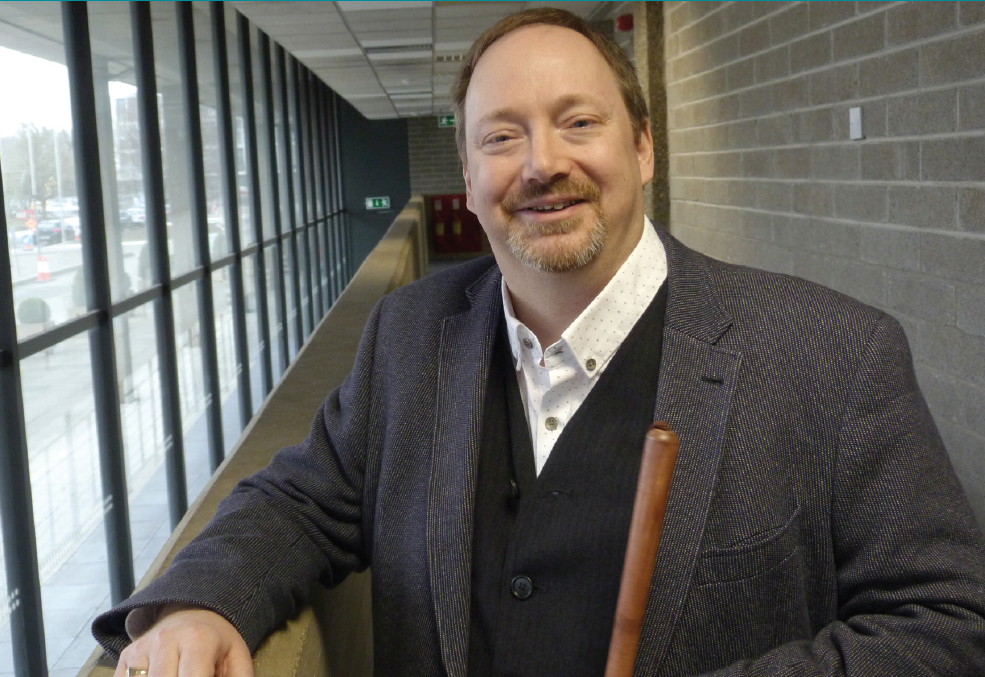It makes good business sense to employ people who are blind or vision impaired. They represent a significant untapped resource in the labour pool, and with the right accommodations and supports are capable of doing most jobs.
Regrettably, less than 1 in 4 people with sight loss are actively participating in the labour force. Vision Ireland is seeking corporate engagement partnerships to better support people who are blind and vision impaired of working age to reach their full potential.
Vision Ireland’s Employment Service
Pre-employment programme
Vision Ireland’s Pre-employment programme is a unique six week programme, providing up to date and relevant training and information on the job market for people with sight loss. Offered both in person and online, the course is run in collaboration with Vision Ireland’s Workplace Partner Programme, with sessions focusing on goal setting, CV writing and interview skills.
Workplace Partner Programme
Vision Ireland Workplace Partner Programme aims to provide people of working age who have sight loss with industry based work experience, to prepare them for entry, or re-entry into the workforce. The Workplace Partner Programme aims to increase confidence, and provide meaningful work experience for job seekers, whilst additionally increasing disability awareness to our workplace partners in employing individuals with sight loss. Vision Ireland proactively works alongside organisations both prior to and during the placement.
Vision Ireland’s Employment Team in conjunction with our workplace partners provides 8 week placement opportunities. Vision Ireland proactively works alongside our workplace partners both prior to and during the placement.
We are currently seeking further Workplace Partners to join the programme. Let us know if you can partner with us.
Employing a person with sight loss
When employing a person who is blind or vision impaired, do not make assumptions about what they can and cannot do — ask them. The individual themselves is the best judge of what their abilities are and what they can and cannot accomplish. If you don’t do this, you could be missing out on an ideal candidate for the position.

“By doing my job well, I hope I am letting everyone know that just because a person has a vision impairment, doesn’t mean they aren’t absolutely capable of doing a great job.
I would like more and more people with sight loss to gain employment, because if we’re not around, we’re not seen and we’re not heard, and employers won’t learn that ability can massively outweigh disability.”
Óran O Neill’s Story, RTÉ
Adjustments and technology which improve access to employment
The Employment Equality Acts of 1998 and 2004 ask employers to make reasonable accommodation for a person with a disability. The accommodations required varies from person to person. Ask the person with sight loss what they need — they are the experts on how to manage their vision impairment.
Technology significantly improves access to employment for many people who are blind or vision impaired. In many cases, grants are available to cover the cost of the technology the person needs.
Assistive technology
Assistive technology can offer employees with sight loss an excellent way of reading and writing at work. Assistive technology can magnify text or images making them easier to see, enlarge text on computer screens or laptops and read aloud what is on the screen. Adapted scanners can also scan printed material onto a computer.
Choosing assistive technology
Vision Ireland’s technology service can advise and demonstrate a range of technology and give the opportunity for employees to try out the technology hands-on. Through Vision Ireland, the employee can be provided with training and support with using this equipment.
What will these adaptations cost?
The Workplace Adaptation Grant, funded by the Department of Employment Affairs and Social Protection, offers a grant to cover the cost of adaptations needed to accommodate a person with a disability in the workplace. Vision Ireland’s technology service can give you a quotation for the cost of a comprehensive range of equipment which you can apply for under this grant.
Other simple adjustments
Below is a list of other easy adaptations in the workplace that can assist employees with sight loss:
- Instead of sending handwritten notes between supervisors and employees or among colleagues, voice or e-mail messages could be sent.
- If the person has some vision, it might be helpful to use a thick felt tip marker to make handwritten notes and names on file folders easier to see.
- Dots of silicon on switches will enable an operator with sight loss to identify and align controls on a machine.
- Many people can find it difficult to see when there is glare or extreme variations in light level. Employees might like to add in additional lighting from desk lamps or adjustable blinds.
- For a job that requires measuring, weighing, or calculations, many different kinds of measuring and calculating devices that ‘talk’ are available from Vision Ireland.

“With technology, having a vision impairment doesn’t matter anymore when it comes to employment. In the end it is not about your sight loss, it is about how good you are at doing your job.”
Kyran O’Mahony, Vision Ireland Head of Technology
Getting to work
Independent travel to a variety of destinations is usually possible for a person who is blind or vision impaired. People are often experienced at finding creative travel solutions. Vision Ireland also offers training to in independent and safe travel.
Application and interview guidelines
When reviewing a candidate’s application, an employer should not limit themselves to the idea that a candidate who is blind or vision impaired is completely different to sighted candidates. There may be certain expectations the job requires, such as driving, but flexibility is important. Consider the job position available and the specific requirements that must be filled. This way of thinking encourages the idea that a job is available to all, in spite of sight loss.
The application form
The application form can be the first barrier facing a suitable candidate. Below are simple adaptations that can make the form accessible:
- Offer the applicant an opportunity to fill out and submit the form by email or in larger print.
- Alternatively, offer to assist them with filling out the form.
Ability tests
If the selection process includes testing, ensure that it does not inadvertently discriminate against people who are blind and vision impaired. Consult candidates with impaired vision or the Vision Ireland in advance, so that necessary adjustments can be made for each individual candidate.
The interview
If the applicant is blind or vision impaired, consider what questions are appropriate to ask during an interview. For example:
- Focus on the person’s qualifications to do the job with or without adjustments – not on the person vision impairment.
- If the interviewer has any doubts about a person’s ability to do the job, ask the applicant how they would go about it.
Other ways to assist a candidate:
- When greeting a candidate, the employer should address the candidate by name and then introduce themselves and other people present in the room. Remember that the candidate may not be able to see an offered handshake.
- If you think the candidate needs assistance, ask what kind of assistance is required.
- When entering the interview room, it may be helpful to describe the setting to the candidate.
- Ensure the reception staff also know how to welcome and assist a visitor who is blind and vision impaired.
Download the leaflet here:
Recommendation for using PDFs with a Screen Reader
For best results please do not open PDFs in your browser
Please save PDF to your device and open with Acrobat Reader